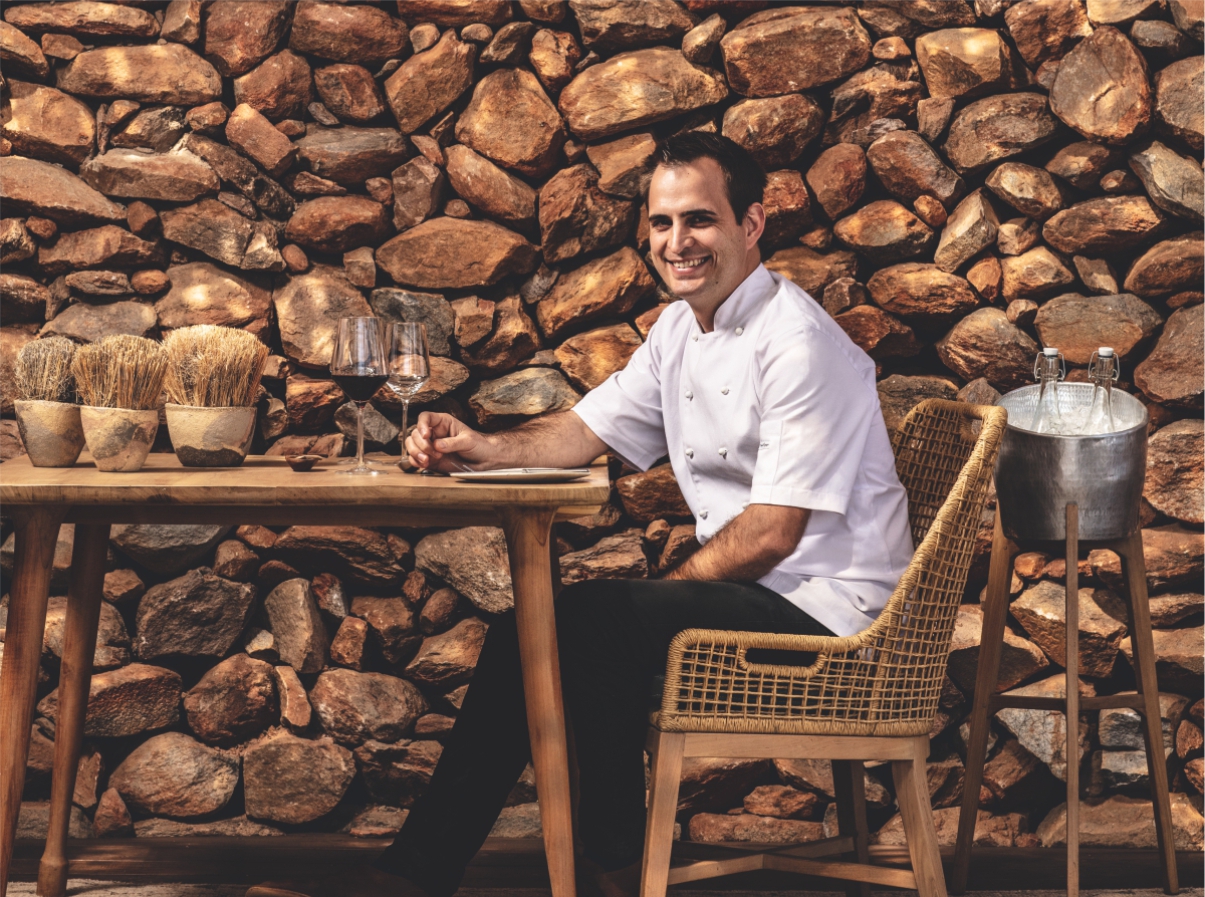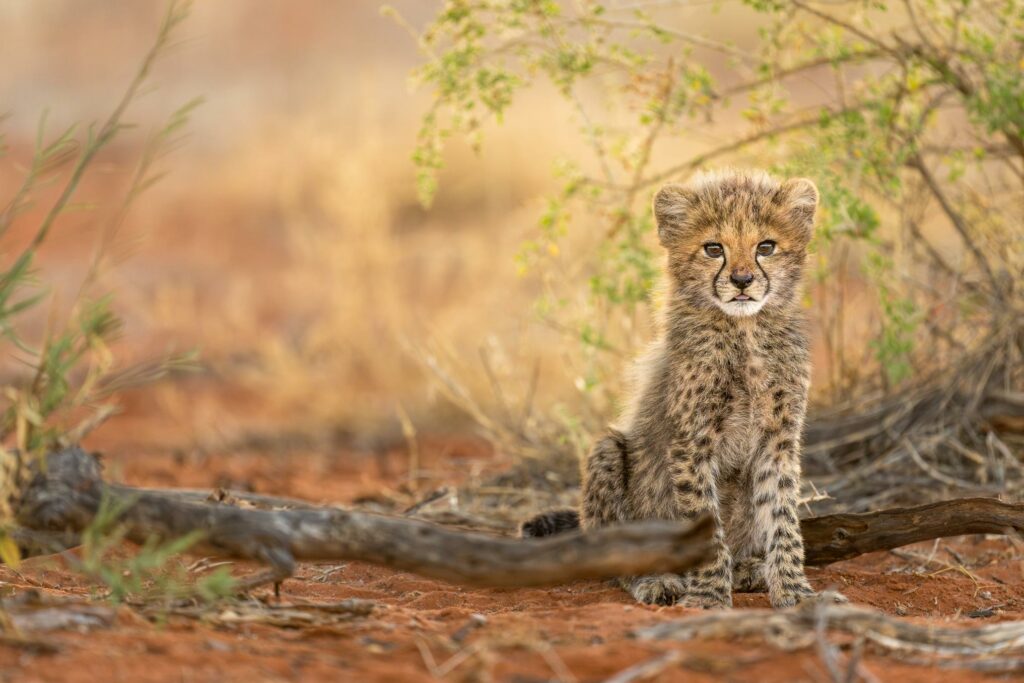IN CONVERSATION WITH MARNUS SCHOLLY
At Tswalu, food is not confined to regular mealtimes, but is part of almost every experience – whether out on a game drive, having a picnic, enjoying lunch on your private veranda or dune dining under the stars. Even the little pantry in each guest suite is crammed with homemade snacks, from biltong to a date and seed bar that is vegan friendly. Every taste is a reminder of South Africa’s culinary heritage, specifically from the Northern Cape, just interpreted in a fresh, modern way. Creating a dining experience in the middle of nowhere that has an authentic sense of place requires resourceful thinking, creativity, and tenacity. We asked Tswalu’s executive chef, Marnus Scholly, about his roots, why he became a chef, his journey to the southern Kalahari, and about the authentic, sustainable food culture that he is helping Jan Hendrik van der Westhuizen to develop at Tswalu – food that is provenance driven, ethically and sustainably sourced, and representative of Northern Cape culture.

Image by Hanfred Rauch
What led you to become a chef?
My father was a dominee (a minister of the Dutch Reformed Church), so we moved around a lot between small towns in South Africa’s interior. I didn’t have the opportunity to lay down roots, as we were always moving on, but all that exposure made me truly adaptable. The very last high school I attended, in the town of Sasolburg, had hospitality as a subject. Something just clicked – I don’t know how else to describe it – when I picked up one of the old knives in the kitchen at that school and held it in my hand. It just sparked something.
How did Tswalu happen?
After working in some of South Africa’s top restaurants and safari lodges for over a decade, I reached a point where I wanted to spend more time with my family. The name Tswalu kept coming up. I soon realised that it wouldn’t be just another safari lodge experience. My wife, Louisa, and I love being in nature, the stillness and the sense of space when you’re far from the city.
I first met Jan Hendrik van der Westhuizen after a really busy service at Clico, the restaurant where I was working in Johannesburg. I did not have a clue what to expect, but we started chatting and there was an immediate connection. I sensed that a career with him would be amazing, especially at Tswalu where I would still be able to nurture my own style in collaboration with Jan. Everything just fell into place after that. It was a dream come true to start a life at a reserve that is conservation focused but also has a unique focus on food.
How has Tswalu changed your outlook on food?
All the chefs in Tswalu’s kitchens come from different backgrounds, each with his or her own speciality, which really captures the diversity of South Africa. I’ve learnt about indigenous edible plants of the southern Kalahari and how to prepare them so that they are palatable. Some are best cooked, others are tastier eaten raw. I’m also in constant contact with the local farmers, so I’ve grown to understand and appreciate the land better. The community in and around Tswalu has had a big impact on shaping our culinary vision by teaching us what the land can yield and how everything depends on water – the most precious commodity of all in the Kalahari. Tswalu’s journey towards greater sustainability informs every decision that we make and what we serve.

How would you compare food innovation at Tswalu with elsewhere?
I’ve always wanted to honour South Africa’s food culture in my cooking, but before Klein JAN opened the irony is that we didn’t have great South African restaurants in our own country. Chef Jan’s got this incredible ability to make the kitchen and table one – to elevate food to an art form. I have learnt how to transform available ingredients into cuisine that can hold its own anywhere in the world, because it has a strong sense of place.
What are some of the challenges of working in a remote place?
When we talk about local suppliers, we are talking about a 400-kilometre sourcing radius! Local in the Northern Cape takes on an entirely new meaning. I’ve enjoyed discovering ingredients, like camel milk, fresh dates and organically farmed grains to mill into flour, which I’ve never had access to before. We never take fresh ingredients for granted – as a chef you learn to become increasingly resourceful. We make everything from scratch, which is humbling. Bread, for instance, is so much more than four simple ingredients. Each ingredient has to pull its weight. The quality of each ingredient becomes critical. I’ve developed a newfound respect for food provenance, and the journey from farm to plate. I trust that every meal we prepare at Tswalu tells the story of the region in some way, tapping into the ancient wisdom of the land and the people who live here.
What is the future of food, in your opinion?
The pandemic we are all living through has definitely made more people understand the value and benefits of eating nourishing, healthy food – and where it comes from. Balance is everything, though. Enjoy the vetjie (animal fat) on a lamb chop, but don’t forget to include vegetables, fruits and whole grains. Supermarkets have skewed our perception and understanding of real food, as almost everything is packaged. The disconnect between what people eat and where it comes from is changing. Everybody can start somewhere, whether it’s selecting fresh produce by hand from a local market or getting to know your neighbourhood butcher and asking for other cuts of meat besides the obvious. Know where your food was farmed and how, learn to preserve and pickle excess fresh produce when it’s in season. Also, take an hour each day to sit down and savour what you eat. In this way you honour not only your body but the food you put into it.


